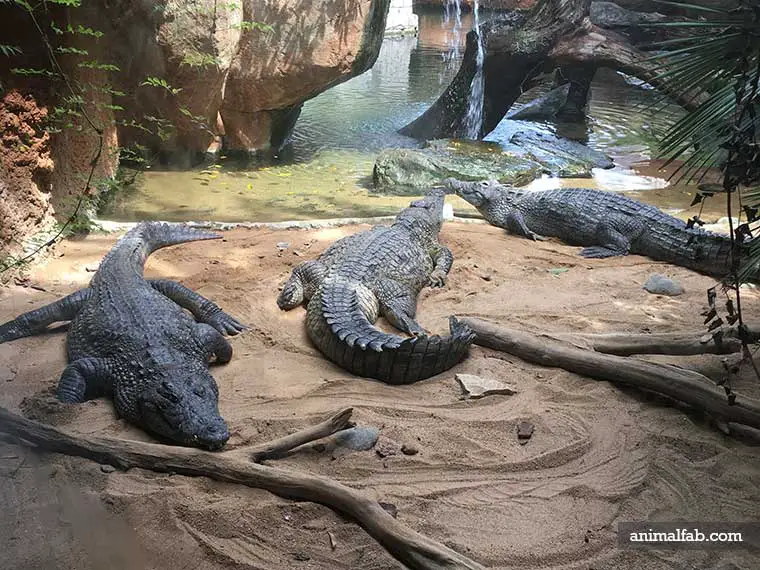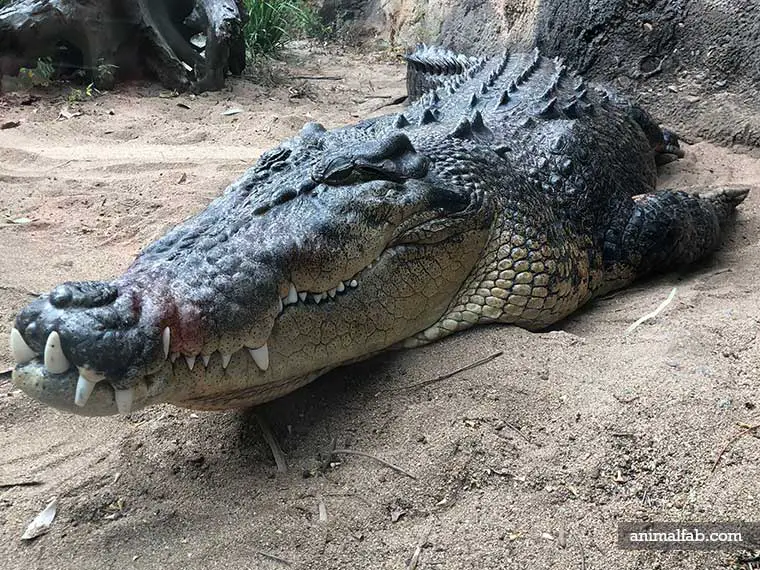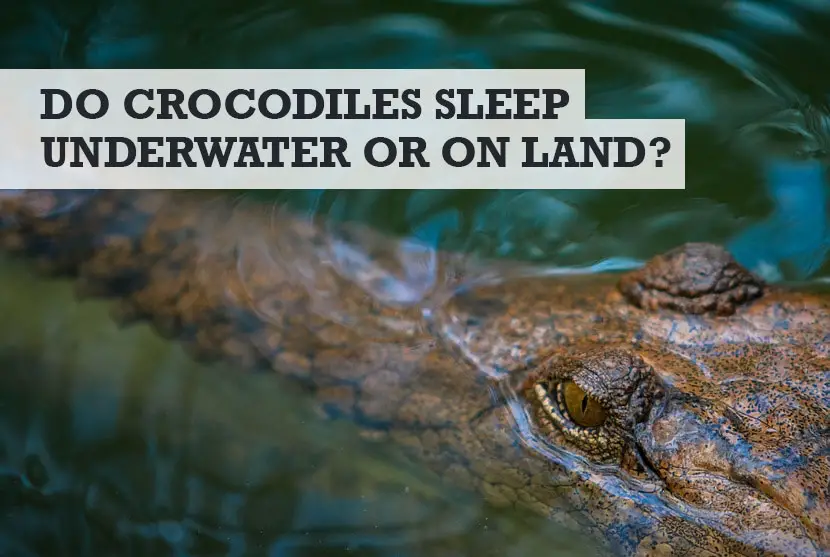Crocodiles fascinate me. Not only are they the last living relatives of a long-extinct order of reptiles but they also once shared the world with dinosaurs. One thing I always wondered though, was how crocodiles sleep, and whether they do that on land or underwater.
Do crocodiles sleep underwater? Crocodiles can sleep underwater but this would be very rare. Crocodiles can stay submerged underwater for as long as 2 hours in certain instances. During this time, they will sometimes rest or sleep.
As you can see, whilst crocodiles do sleep underwater, it won’t be where they get most of their sleep. Most of the time, they won’t be sleeping.
Below I’ve gathered some more information about the strange sleeping habits or crocodiles, which explains whether they sleep on land or underwater.
Where do crocodiles sleep (underwater or on land)?
Most of the year crocodiles will sleep alongside the river or in waterside vegetation areas. So, in simple terms, crocodiles sleep on land, and not underwater when they need to rest, and often close to other crocodiles.

At times, they may also take naps on or in the water, although this behavior is rare.
However, when the weather gets too hot, the vast majority of crocodiles will search for a suitable place to aestivate. Once they have found an area, usually a riverbank far away from human or animal activity, they will dig a hole in the mud and crawl in to sleep.
Crocodiles can spend months sleeping here and waiting for the adverse weather to pass. Incredibly, crocodiles can survive without food for up to 2 or 3 years and therefore don’t need to hunt while in this state.
How does a crocodile sleep?
Most of the time, crocodiles will sleep much like any other wild animal, usually in regular bursts throughout the day. However, they will sleep lightly and remain on the lookout for animals that could pose a threat to them, such as jaguars, leopards, and anacondas.
How long do crocodiles sleep for?
Crocodiles are notorious for enjoying their sleep and will often spend 17 hours or more sleeping throughout the day, especially when digesting food or basking in the sun.
Do crocodiles sleep at night?
If you have ever wondered what time of day crocodiles sleep, it’s mainly during the day. They are active mostly at night, so don’t tend to sleep as much in nighttime hours.
Much like other crocodilians, such as caimans and alligators, crocodiles tend to sleep intermittently throughout the day. However, as mentioned previously, they are primarily nocturnal animals and are more active at night.

Although a crocodile won’t hesitate to hunt prey during the daylight hours, especially if it sees an opportunity. The crocodile is more likely to spend its time lying on a bank at the side of the river when the sun is out. Several species of crocodile actively hunt during the day, such as the Saltwater and Nile crocodile.
Handy Hint: Did you know that crocodiles can jump as high as 5 feet on land?
Crocodiles are cold-blooded so need to regulate their body temperature to survive. This process is called aestivation and is somewhat like brumation, which I touched on above.
However, unlike brumation, crocodiles typically use aestivation to survive drought or extremely high temperatures, usually in arid countries like Africa and Asia. Although crocodiles love warm climates, extremely hot weather will quickly cause them to dry out, overheat and eventually perish.
To conclude on what time of day crocodiles sleep, most species of crocodiles sleep more often during the day as they are nocturnal. If the weather takes a turn for the worse, they may seek shelter and go into dormancy, and then sleep even during the night.
Why do crocodiles sleep with one eye open?
Chances are if you have Australian roots, you’ve probably heard of the famous legend about the crocodile’s ability to sleep with one eye open. Incredibly, there’s some truth to this.
In 2015, the BBC reported that:
Crocodiles can sleep with one eye open, according to a study from Australia.
In doing so they join a list of animals with this ability, which includes some birds, dolphins, and other reptiles.
This news report was based on a study published in the Journal of Experimental Biology, crocodiles are one of a select few animals (the others being birds, reptiles, and dolphins) that always sleep with half of their brain active.
This unique trait allows them to engage in “bilateral eye closure” or keeping one eye open while they rest. They do this to keep an eye out for potential dangers and so they can quickly react if prey wanders too close.
During the study, researchers observed multiple crocodiles sleeping with one eye open, especially when there was a researcher close by.
What’s more, their eye would follow the individual around the room, which is kind of creepy if you ask me!
So, that’s a very brief overview of how crocodiles sleep. It’s unlikely to be underwater as we’ve established, but there’s more to know too.
Handy Hint: Crocodiles will often bask in the sun with their mouth open, and the reason why is very interesting!
How do crocodiles stay underwater for so long?
Most species of crocodiles (as well as alligators, caimans, and gharials) can spend hours underwater without needing to come up for air. The reason they have this ability is due to them having a four-chambered heart.
This heart closely resembles humans and works in much the same way – it takes in deoxygenated blood from the body, sends the blood to the lungs to oxygenate, and then pumps the blood back around the body.
However, crocodiles have a small opening in their hearts (called the foramen of Panizza) that prevents blood from flowing to their lungs when they are submerged. This allows them to drop their heart rate to as low as 2 to 3 beats per minute to reduce oxygen consumption.
During prolonged dives, crocodiles can adjust this oxygen consumption to dive for longer periods. Additionally, they can also direct oxygen-rich blood to areas in their body where it’s most required.
Can crocodiles drown underwater?
In general, smaller species of crocodiles are unable to hold their breath for as long as larger species. What’s more, most crocodiles prefer not to stay underwater for longer than 15 minutes when hunting or traveling downriver.
Instead, a crocodile will only spend long durations underwater when they are resting or trying to avoid adverse weather conditions.
If forced underwater, the average crocodile will probably drown in as little as 20 to 30 minutes. This can happen when they expend all their oxygen whilst struggling against an attacker.
Sadly, it’s not unusual for crocodiles to suffocate when accidentally caught in underwater nets or traps.
Handy Hint: Did you know that crocodiles can have as many as 2,000 teeth in their lifetime!
Do crocodiles hibernate?
Although crocodiles don’t hibernate like mammals, they will sometimes enter a hibernation-like mode called brumation to survive extremely cold weather.
During brumation, crocodiles will stay awake while their heart rate and metabolism slow down to a crawl. Although they won’t need to eat during this state, they will need to take regular sips of water to survive.
In colder areas, alligators and crocodiles have even been observed sticking their snouts above ice while their bodies remained submerged.
Conclusion
The next time you see a crocodile in the water, don’t be fooled into thinking he’s asleep. He’s likely very awake and will be alert to all that’s going on around him.
Crocodiles should not be approaching when sleeping, as if awakened will likely lash out and react.
You might also like…
- Can a crocodile jump into your boat?
- Can you open a crocodile’s mouth with your bare hands?
- The truth about horses and donkeys mating
Image in header via https://pixabay.com/photos/saltwater-crocodile-australian-3463562/

